The Taiwan People’s Party (TPP) yesterday won five at-large seats to become the third-largest party in the Legislative Yuan, followed by the New Power Party (NPP) with three at-large seats.
The Taiwan Statebuilding Party obtained one regional legislator seat, while independent candidates secured five.
The TPP is a nascent party established in August last year by Taipei Mayor Ko Wen-je (柯文哲), who was elected its founding chairman, and while Ko did not run for president, the party nominated 18 regional legislators and announced a list of 29 legislator-at-large nominees.
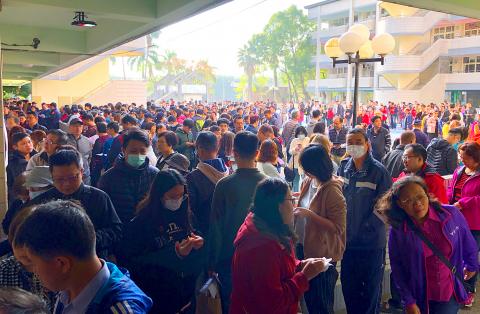
Photo: CNA
The TPP failed to obtain regional legislator seats, but secured the at-large seats by gaining 1,588,806 or 11.2203 percent of the overall political party votes.
Topping the TPP’s list of legislator-at-large candidates was Taipei Department of Labor Commissioner Lai Hsiang-lin (賴香伶), followed by National Sun Yat-sen University College of Social Science dean Jang Chyi-lu (張其祿), Hon Hai Technology Group Industrial Big Data Office vice president Ann Kao (高虹安) and World Taiwanese Chambers of Commerce secretary-general Andy Chiu (邱臣遠).
Ko has said that he hoped that with the founding of the TPP, people would be given another choice besides the Chinese Nationalist Party (KMT) and Democratic Progressive Party, and that the TPP, which favors an open and transparent government, aims to gain enough legislative seats to become a critical minority party that would keep the two major parties in check.
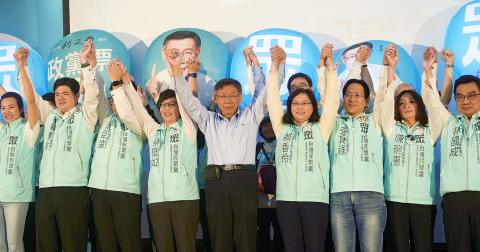
Photo: Chang Chia-ming, Taipei Times
The NPP garnered 7.7549 percent of the party votes, a slight improvement from the 6.1 percent it received in the 2016 elections.
Topping the NPP’s list of at-large nominees is environmentalist Chen Jiau-hua (陳椒華), followed by former NPP chairman and human rights lawyer Chiu Hsien-chih (邱顯智) and Claire Wang (王婉諭), whose four-year-old daughter, nicknamed “Little Lightbulb” (小燈泡), was murdered on a street in Taipei in 2016.
In the 2016 elections, aside from the DPP and KMT, only the NPP and the People First Party (PFP) obtained enough party votes to cross the 5-percentage-point threshold and secure legislator-at-large seats, receiving two and three seats respectively.
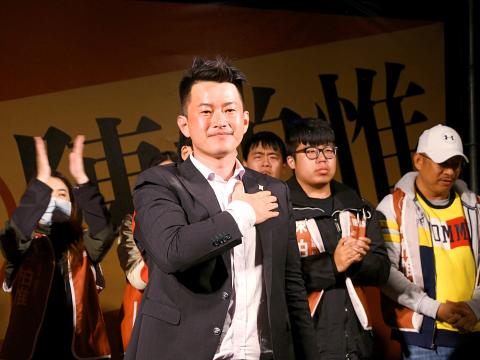
Photo: CNA
The PFP did not receive enough votes this year.
Under the “single-member constituency, two-vote system,” eligible voters can cast two ballots in the legislative elections, one for a regional candidate and the other for a party, and 34 legislator-at-large seats are distributed between the parties according to the proportion of party votes they obtain.
A record high of 19 parties ran in this year’s elections.
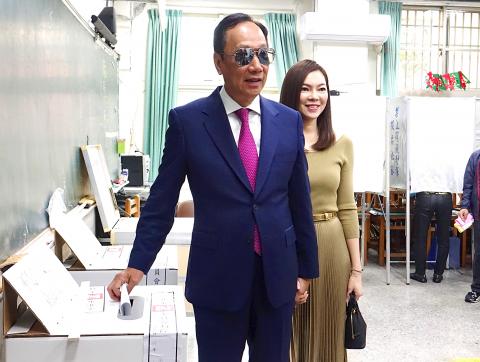
Photo: Wang Yi-sung, Taipei Times
Among the “third-force” parties and independent candidates, the most attention-grabbing legislators-elect are DPP-endorsed Taiwan Statebuilding Party spokesman Wonda Chen (陳柏惟), DPP-endorsed independent Legislator Freddy Lim (林昶佐), independent Legislator Chao Cheng-yu (趙正宇) and independent candidate Fu Kun-chi (傅崐萁).
Wonda Chen won in a traditional KMT stronghold, Taichung’s second electoral district — which includes the Dadu (大肚), Wurih (烏日), Longjing (龍井), Shalu (沙鹿), Wufeng (霧峰) districts and and part of Dali District (大里).
He is the first legislator elected from the Taiwan Statebuilding Party — formerly known as Taiwan Radical Wings — a new party founded in Kaohsiung that is considered to belong to the pro-independence camp.
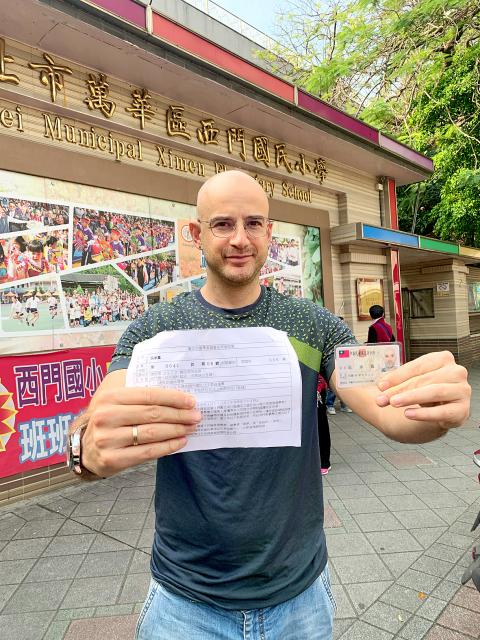
Photo: Hsiao Fang-chi, Taipei Times
Wonda Chen’s defeat of Yen Kuan-heng (顏寬恆) came as a surprise to many, as Yen has been a legislator for two terms after winning a by-election in 2013 to fill the vacant post left by his father, former Non-Partisan Solidarity Union legislator Yen Ching-piao (顏清標), after he was found guilty of corruption.
The Yen family has governed the district for more than a decade.
Lim, the frontman for metal band Chthonic, was re-elected in Taipei’s Zhongzheng-Wanhua (中正-萬華) electoral district by obtaining 81,853 votes, or 44.9137 percent, defeating former KMT legislator Lin Yu-fang (林郁方) a second time.
Lim was first elected in 2016 as an NPP member, but announced in August last year that that he would leave the party to support President Tsai Ing-wen’s (蔡英文) re-election bid.
However, DPP-endorsed independent Legislator Hung Tzu-yung (洪慈庸), another former NPP legislator who left the party in August last year, failed to win re-election in Taichung’s third electoral district.
Fu, a former Hualien county commissioner who was imprisoned for eight months between 2018 and last year for insider trading, won in Hualien County by obtaining 64,060 votes, and is to replace DPP Legislator Hsiao Bi-khim (蕭美琴).
Chao won in Taoyuan’s sixth electoral district, defeating KMT Legislator Apollo Chen (陳學聖).

Intelligence agents have recorded 510,000 instances of “controversial information” being spread online by the Chinese Communist Party (CCP) so far this year, the National Security Bureau (NSB) said in a report yesterday, as it warned of artificial intelligence (AI) being employed to generate destabilizing misinformation. The bureau submitted a written report to the Legislative Yuan in preparation for National Security Bureau Director-General Tsai Ming-yen’s (蔡明彥) appearance before the Foreign Affairs and National Defense Committee today. The CCP has been using cognitive warfare to divide Taiwanese society by commenting on controversial issues such as Taiwan Semiconductor Manufacturing Co’s (TSMC, 台積電) investments in the

INVESTIGATION: The case is the latest instance of a DPP figure being implicated in an espionage network accused of allegedly leaking information to Chinese intelligence Democratic Progressive Party (DPP) member Ho Jen-chieh (何仁傑) was detained and held incommunicado yesterday on suspicion of spying for China during his tenure as assistant to then-minister of foreign affairs Joseph Wu (吳釗燮). The Taipei District Prosecutors’ Office said Ho was implicated during its investigation into alleged spying activities by former Presidential Office consultant Wu Shang-yu (吳尚雨). Prosecutors said there is reason to believe Ho breached the National Security Act (國家安全法) by leaking classified Ministry of Foreign Affairs information to Chinese intelligence. Following interrogation, prosecutors petitioned the Taipei District Court to detain Ho, citing concerns over potential collusion or tampering of evidence. The

‘COMPREHENSIVE PLAN’: Lin Chia-lung said that the government was ready to talk about a variety of issues, including investment in and purchases from the US The National Stabilization Fund (NSF) yesterday announced that it would step in to staunch stock market losses for the ninth time in the nation’s history. An NSF board meeting, originally scheduled for Monday next week, was moved to yesterday after stocks plummeted in the wake of US President Donald Trump’s announcement of 32 percent tariffs on Taiwan on Wednesday last week. Board members voted to support the stock market with the NT$500 billion (US$15.15 billion) fund, with injections of funds to begin as soon as today. The NSF in 2000 injected NT$120 billion to stabilize stocks, the most ever. The lowest amount it

NEGOTIATIONS: Taiwan has good relations with Washington and the outlook for the negotiations looks promising, Minister of Economic Affairs J.W. Kuo said Taiwan’s GDP growth this year is expected to decrease by 0.43 to 1.61 percentage points due to the effects of US tariffs, National Development Council (NDC) Minister Paul Liu (劉鏡清) said at a meeting of the legislature’s Economics Committee in Taipei yesterday, citing a preliminary estimate by a private research institution. Taiwan’s economy would be significantly affected by the 32 percent “reciprocal” tariffs slapped by the US, which took effect yesterday, Liu said, adding that GDP growth could fall below 3 percent and potentially even dip below 2 percent to 1.53 percent this year. The council has commissioned another institution